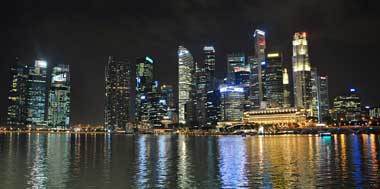As the Singaporean economy grows and grows, more and more foreign money pours into Singapore. Thanks to the state's low corporate tax rates, tremendously free market and highly advantageous business laws, firms and organisations from around the world are lining up to pump their cash through Singapore.
Though the state is benefiting greatly from this investment and interest, it is only understandable that Singaporean companies would become interesting in sending investment the other way – i.e. investing money in western countries, particularly those in the EU. Yet, due to the stricter and more regimented economies there, this is not always straight forward.
In order to make things simpler for both sides, a potential Free Trade Agreement between the more powerful EU economies and Singapore has long been mooted. After all, a mutually beneficial FTA would allow both consumers and businesses on all sides to make the most from Singapore's strengthening economic power. However, though Singaporean Prime Minister Lee Hsien Loong and German Chancellor Angela Merkel have both backed such a move, it now seems unlikely it will come into place until at least late 2016. The main issue, according to Mr Lee, is that countries in the EU require more time to get their own economic issues in order before opening up the gates for such trading. Currently we understand that Singapore has an extensive network of 20 implemented FTAs with 31 trading partners.
After meeting with Ms Merkel, Lee said, “The ratification process is on the European side. The text is still undergoing some legal scrubbing. Some parts are completed, some parts are not. Then you have to go through a long process, including voting at the European Parliament and including ratification by majority of the European member states.”
One of the central issues holding the potential FTA back is such an agreement's need for a provision for investor-state dispute settlement. This provision would allow a company to take action against a country's government outside of its borders and, though very helpful for companies in Singapore investing in the EU, it has been less popular with those on the other side.
Chancellor Merkel, however, is very much keen on pushing through the FTA as quickly as she can. Given Germany's status as one of the world's most active and consistent exporters of products, it is clear why Merkel wants to open up as many potential trade routes as possible for her economy. Mr. Lee highlighted the similarities between Germany and Singapore at the press conference, with the states sharing many of the same advantages and disadvantages. As well as both housing booming economies and powerful workforces, both nations may soon have to deal with issues brought about by ageing population and lowering birth rates. Many of the same political issues are on both state's radar too, such as multicultural integration and the threat of radical political ideologies.
In particular, Mr. Lee cited the Islamic State group as a menace to both Germany and Singapore, pointing out that both German and Singaporean Muslims have left their native countries to join the brutal jihadist outfit. Therefore, anything that strengthens the existing bonds between the two states, and makes communication between them more straightforward, should be welcomed.

